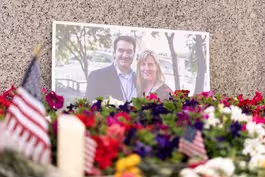
Israel and Iran launch deadly strikes for third straight day
Clip: 6/15/2025 | 5m 2sVideo has Closed Captions
Israel and Iran launch new round of strikes as deadly conflict rages into third day
Israel and Iran exchanged missile barrages for a third straight day Sunday. A human rights group says Israel’s strikes have killed at least 406 people in Iran, while the death toll in Israel rose overnight to 13. John Yang speaks with Josef Federman, the Associated Press news director for Israel, Jordan and the Palestinian territories, for the latest developments.
Problems playing video? | Closed Captioning Feedback
Problems playing video? | Closed Captioning Feedback
Major corporate funding for the PBS News Hour is provided by BDO, BNSF, Consumer Cellular, American Cruise Lines, and Raymond James. Funding for the PBS NewsHour Weekend is provided by...

Israel and Iran launch deadly strikes for third straight day
Clip: 6/15/2025 | 5m 2sVideo has Closed Captions
Israel and Iran exchanged missile barrages for a third straight day Sunday. A human rights group says Israel’s strikes have killed at least 406 people in Iran, while the death toll in Israel rose overnight to 13. John Yang speaks with Josef Federman, the Associated Press news director for Israel, Jordan and the Palestinian territories, for the latest developments.
Problems playing video? | Closed Captioning Feedback
How to Watch PBS News Hour
PBS News Hour is available to stream on pbs.org and the free PBS App, available on iPhone, Apple TV, Android TV, Android smartphones, Amazon Fire TV, Amazon Fire Tablet, Roku, Samsung Smart TV, and Vizio.
Providing Support for PBS.org
Learn Moreabout PBS online sponsorshipJOHN YANG: And now to the Middle East, where Israel and Iran exchanged airstrikes and missile barrages for a third straight day.
Israel struck at least two oil refineries as it widens its target list beyond military and nuclear facilities.
In addition, Israel warned Iran to evacuate arms factories.
A human rights group that's long tracked Iran says Israel's strikes have killed at least 406 people and wounded another 654.
In response, Iran launched more missiles into Israel.
Outside Tel Aviv early this morning, rescue teams searched for survivors in the rubble of an apartment building.
At least 10 people in Israel have been killed overnight, bringing the death toll there to 13.
Josef Federman is the Associated Press news director for Israel, Jordan and the Palestinian territories.
Joe, what's the latest on what's going on the ground in Israel right now?
JOSEF FEDERMAN, The Associated Press: Well, this military operation is continuing.
Israel is continuing to strike targets in Iran.
So that means that we are seeing repeated barrages of missile fire.
In fact, just over an hour ago, we had another missile attack.
Nothing landed here in Jerusalem.
This time the missiles fell in northern Israel.
But these alerts are affecting the entire country.
Oftentimes we can look up in the sky and you can see interceptions and things flying overhead.
So, you know, we're seeing it across the country and feeling it everywhere.
JOHN YANG: And this is all -- this is nationwide.
This isn't concentrated in a particular part of the nation.
JOSEF FEDERMAN: No, the alerts are going off across the country.
We have gone through three drills in the past 24 hours where the landings have been across the country.
We've seen them in the Tel Aviv area in northern Israel and even south of Tel Aviv as well.
Nothing so far has landed in Jerusalem, but you do feel it.
You see interceptions overhead, and you hear the thunder, the booming, almost sort of like a bass drum or thunder off in the distance because everything is relatively close here.
JOHN YANG: Help us understand what it's like to live with this threat looming over you.
JOSEF FEDERMAN: It's very disruptive.
You can feel it really everywhere you go.
The other night I was on the first night of the fighting, I was driving home from the office, and it reminded me of those early days of COVID.
The roads were just completely empty.
Maybe you would see a taxi here and there, but really empty things have come alive just a little bit.
But the volume -- the number of people you see on the streets is minimal.
Many of the stores are closed or closing early.
Schools are only learning over Zoom right now.
So it's really disrupted life across the country.
It affects people's moods.
People are tense, they're worried, and they don't know where this is headed.
JOHN YANG: You know, over the past 25 years, Israelis have dealt with suicide bombers, rockets coming from Lebanon, rockets coming from Gaza.
I'm wondering, do you have a sense of how people are reacting in comparison, how it compares to those other things?
JOSEF FEDERMAN: It's always hard to compare.
Each one is unique.
Each one has its own sets of challenges.
This one is quite scary just because the types of weapons that are being fired here.
These missiles are huge.
The prime minister has compared them to sort of flying buses, and they are sending barrages of dozens of them at the same time.
What makes this conflict different compared to the other ones that you mentioned is that Israel does have that air defense system.
You probably heard about Iron Dome and other systems that they use to intercept these missiles.
So that does give you some sense of personal security.
But the system isn't 100 percent.
And when dozens and dozens of these missiles are coming, it's almost inevitable that something's going to get through.
And just that feeling that it's so random, you don't know where it's going to come down.
You don't know if you're 100 percent safe.
So this time around is quite chilling, just like all the other ones.
JOHN YANG: This is, of course, on top of almost a year and a half now of war in Gaza.
What's the public sentiment about this?
JOSEF FEDERMAN: Well, after a year and a half of conflict in Gaza, the country's become very divided over that.
There's a large number of people who just want to see that war end.
And you probably know there are hostages who remain inside Gaza.
They want to see those hostages come home.
But so far, the public I haven't seen opinion polls yet.
We're only a few days into this, but the public does seem to be lining up behind this one.
Israel's opposition leader Yair Lapid also has come out in favor.
There's really a widespread consensus.
Iran is seen as the biggest threat, the biggest enemy to Israel.
And that feeling is pretty widespread.
So early on, at least the public seems to behind this.
But we've seen this many times before.
Operations start off kind of clean with lots of support.
The longer they drag on, the more things can get messy and the more the nation can become divided.
JOHN YANG: Josef Federman of The Associated Press in Jerusalem, thank you very much and stay safe.
JOSEF FEDERMAN: Thank you.
How teenage rising golf star Genesis Lewis got into the game
Video has Closed Captions
Clip: 6/15/2025 | 4m 23s | How teenage rising golf star Genesis Lewis got into the game (4m 23s)
Klobuchar reflects on legacy of slain Minnesota lawmaker
Video has Closed Captions
Clip: 6/15/2025 | 5m 54s | Minnesota Sen. Klobuchar reflects on legacy of slain state lawmaker (5m 54s)
News Wrap: World leaders arrive in Canada for G7 summit
Video has Closed Captions
Clip: 6/15/2025 | 2m 48s | News Wrap: World leaders arrive in Canada for G7 summit (2m 48s)
‘Panic industry’ booms as more Americans fortify their homes
Video has Closed Captions
Clip: 6/15/2025 | 5m 25s | ‘Panic industry’ surges as more Americans fortify their homes to prepare for the worst (5m 25s)
Providing Support for PBS.org
Learn Moreabout PBS online sponsorshipSupport for PBS provided by:
Major corporate funding for the PBS News Hour is provided by BDO, BNSF, Consumer Cellular, American Cruise Lines, and Raymond James. Funding for the PBS NewsHour Weekend is provided by...















